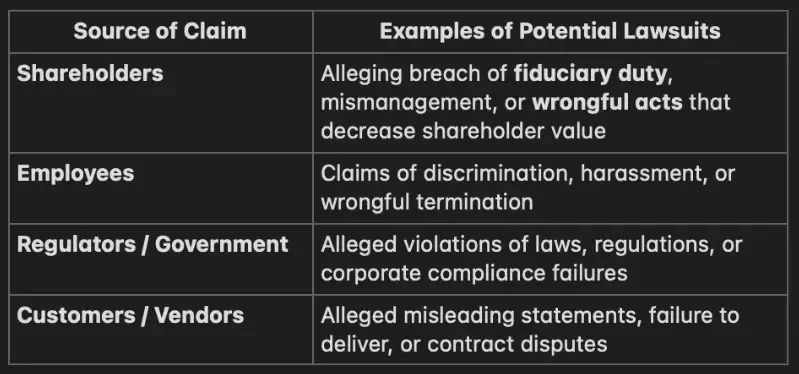In today’s complex business environment, company leaders face unprecedented risks. Decisions made by executives can significantly impact a company’s financial health, reputation, and regulatory compliance. This is where Directors and officers insurance (D&O insurance) comes in a safety net that protects executives, board members, and even the company itself from the financial consequences of legal claims. Whether you are a startup executive or part of a large corporation, understanding D&O insurance is crucial for risk management for executives and safeguarding your leadership.
What is Directors & Officers (D&O) Insurance?
Directors and officers insurance is a specialized form of liability coverage designed to protect corporate directors and officers from personal losses resulting from claims made against them while performing their managerial duties.
This insurance covers:
- Legal defense costs for lawsuits brought against executives
- Settlements or judgments arising from allegations of wrongful acts
- Personal asset protection when executives are sued in their individual capacity
D&O insurance is not only a protective tool for individuals; it also provides company reimbursement and entity coverage, helping the organization cover costs related to defending its directors and officers. By securing a D&O policy, companies demonstrate strong corporate governance and commitment to responsible leadership.

The Sources of Risk: Who Can Sue a Director or Officer?
Directors and officers are exposed to a variety of risks. Claims can originate from multiple sources, often beyond the company’s internal control. Here’s a breakdown:

Executives must understand that even unintentional mistakes can result in costly legal action. A robust board of directors insurance policy mitigates these financial risks and allows executives to focus on strategic growth rather than fearing litigation.
Understanding the "Sides" of D&O Coverage
D&O insurance typically covers three main aspects, often referred to as Side A, Side B, and Side C coverage:
- Side A: Protects individual directors and officers when the company cannot indemnify them. This is crucial for personal asset protection.
- Side B: Reimburses the company for costs it incurs while defending its executives.
- Side C: Covers the company itself against claims made directly against it, often in shareholder lawsuits or regulatory actions.
By understanding these distinctions, companies can tailor D&O policies to meet their unique risk exposure and reinforce strong management liability protection.
Why D&O Insurance is More Critical Than Ever
In today’s litigious business world, the stakes for executives are higher than ever. Factors increasing the need for D&O coverage include:
- Rising shareholder activism and lawsuits
- Increasing regulatory scrutiny across industries
- Rapidly changing market conditions leading to unintentional missteps
- Greater public expectation for corporate transparency and corporate governance
A comprehensive D&O liability policy not only protects executives but also serves as a key component of corporate risk management for executives, attracting top talent who know their leadership decisions are safeguarded.

Navigating Complexity with a Specialist Broker
Securing the right D&O insurance policy can be complex. Policies differ in coverage limits, exclusions, and terms. Engaging with a professional insurance broker can provide:
- Guidance in selecting coverage tailored to your organization’s management liability exposure
- Access to competitive premiums and specialized carriers
- Assistance in interpreting policy language and understanding entity coverage clauses
An experienced broker ensures your company and its directors are adequately protected against both expected and unforeseen claims.
Frequently Asked Questions (FAQs)
Is D&O insurance the same as Professional Liability Insurance?
No. While professional liability insurance covers errors in the services you provide, D&O insurance specifically protects corporate leaders from claims arising from their decisions and actions in managing the company.
Our company is privately owned. Do we still need D&O insurance?
Absolutely. Claims can arise in private companies from employees, shareholders, or regulatory authorities. D&O insurance ensures your executives have personal asset protection regardless of company size.
Does D&O insurance cover fraud or criminal acts?
Typically, D&O insurance excludes intentional illegal acts. However, it may cover defense costs until the court determines wrongdoing. Always review policy exclusions carefully with your broker.
Who pays the premium for a D&O policy?
Premiums are usually paid by the company on behalf of its directors and officers. This approach reinforces corporate responsibility and fiduciary duty compliance.

